Nepal's main party leading in poll results but no majority
Nepal’s main ruling party is leading in last week’s parliamentary elections with most of the votes counted

Nepal's main ruling party was leading in last week's parliamentary elections with most of the votes counted by Monday.
Prime Minister Sher Bahadur Deuba's Nepali Congress party, however, was short of securing a majority in the House of Representatives, the lower house of Parliament.
Deuba's party has won 52 seats while the main rival Communist Party of Nepal (United Marxist-Leninist) has 41 seats. Results have been declared in 150 of the total 165 directly elected districts.
Nepal's Parliament has a total of 275 members, out of which 165 are directly elected and the remaining 110 chosen by the political parties who area allocated seats in proportion to the votes they get.
Deuba's party is currently in an alliance with four others and together they are likely to have a majority of seats, which would allow them to form a coalition government. However, no official announcement have been made on the future of their partnership.
The Nov. 4 election was marred by sporadic violence and lower-than-expected turnout, which many hoped would bring political stability in the Himalayan nation that has changed 13 governments in the last 16 years.
Frequent changes in government and squabbles among parties have been blamed for a slow economy.
The final results are likely to take a few more days. With no one party having a majority, it will take some time for the political parties to agree on a new government and prime minister.
The next government will face challenges of keeping a stable administration, reviving the tourism industry and balancing the relationship between two neighboring giants — China and India.
Bookmark popover
Removed from bookmarks